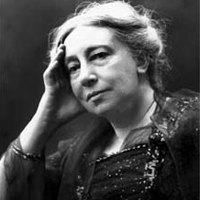Summary of The Rising of The Moon
The Rising of the Moon by Lady Gregory: Summary
On a moonlit night at an Irish wharf by the sea, three Irish policemen in the service of the occupying English government pasted up wanted posters for a clever escaped political criminal. Convinced that the escaped rebel might creep to the water's edge to be rescued by sea, they all hoped to capture him for the hundred-pound reward and perhaps even a promotion.
Lady Gregory (1852-1932)
The Sergeant sent his two younger assistants with the only lantern to post more leaflets around town while, uneasily, he kept watch at the water's edge.
A man in rags tried to slip past the Sergeant, explaining that he merely wanted to sell some songs to incoming sailors. The Ragged Man identified himself as "Jimmy Walsh", a ballad singer. When the man headed toward the steps to the water, the Sergeant stopped him, insisting that "Jimmy" leave by way of town. Trying to interest the officer in his songs, the man sang a few ballads to the protesting Sergeant, who wanted only to keep the area clear so he could catch the fleeing prisoner if he appeared. He ordered the man to leave the area immediately.
The Ragged Man pretended to start toward town but stopped to comment on the face on the poster, saying that he knew the man well. Interested, the Sergeant's changed his mind about sending the Ragged man away, and insisted that the stranger stay to furnish more information about the fugitive. The Ragged Man described a dark, dangerous, muscular man who was an expert with many weapons, then he hinted at previous murders of policemen on moonlit nights exactly like the present one.
Frightened, the Sergeant gladly accepted the Ragged Man's offer to stay with him on the wharf to help look for the escaped murderer. Sitting back-to-back on a barrel in order to have full view of the dock area, the two men smoked pipes together to calm the Sergeant's nerves. The Sergeant confessed that police work was difficult, especially for family men, because the officers spent long hours on dangerous missions. Accompanying the Sergeant's lament, the Ragged Man started to sing a traditional, sentimental song about lovers and the beautiful Irish countryside. Then he began a nationalistic ballad about a legend, oppressed old Irishwoman named Granuaile. The Sergeant stopped him, protesting that it was inappropriate to sing about Irish oppression when political tempers were flaring between Ireland and England. His ragged companion replied that he was only singing the song to keep up his spirits on their dangerous and lonely watch.
Then the Ragged Man grabbed his chest as if the forbidden singing was necessary to calm his frightened heart, so the pitying Sergeant allowed him to continue his ballad. Again, the man sang about the fabled Irish martyr, Granuaile, but this time he inserted the wrong lyrics. Immediately, the Sergeant corrected the man and sang the proper line, revealing his knowledge of a rebel song, even though he was supposed to be loyal to the English rulers.
The ballad-man slyly began to probe the Sergeant's memories of former days when, as a young man, the Sergeant lovingly sang several traditional Irish ballads, including "Granuaile". Confidentially, the Sergeant admitted that he had sung every patriotic ballad the Ragged Man named. The man suggested that the Sergeant and the fugitive perhaps shared the same youthful memories; in fact, the escaped prisoner might even have been among the Sergeant's close friends in their younger days. When the Sergeant admitted the possibility, the ballad-man described a hypothetical scene in which the Sergeant joined in with those former singing friends to free Ireland. Therefore, the Ragged Man, concluded, it might have been fated that the Sergeant would be the pursued instead of the pursuer.
Caught up in the hypothetical scenario, the Sergeant mused that if he had made different choices—not going into the police force, not marrying and having children—he and the fugitive could well have exchanged roles. The possibility became so real for him that he began to confuse his own identity with the escape and imagined himself stealthily trying to escape, violently shooting or assaulting police officers. He was startled out of his reverie by a sound from the water, he suspected that he rescues had at last arrived to carry away the fugitive.
The Ragged Man contended that the Sergeant in the past sympathized with the Irish nationalists and not with the law he currently represented. In fact, he suggested that the Sergeant still doubted the choice he made for the English law but against "the people". Boldly singing the rebel tune, "The Rising of the Moon", as a signal to the rescuers on the water and ripping off his hat and wig, "Jimmy", the "ballad-man", revealed that he was in fact the fugitive himself, with a hundred-pound reward on his head.
Startled and struggling with his heretofore suppressed sympathies for the rebels, the Sergeant threatened to arrest the escapee and collect the reward when his younger police companies approached. He protested that his own rebel sentiments were buried in the past. Slipping behind the barrel seat they had shared to hide from the nearing officers, the fugitive called on the Sergeant's love for Ireland to keep his presence secret. Quickly hiding the fugitive's wig and hat behind him, the Sergeant denied to his sub-ordinates that he has seen anyone. When the officers insisted that they stay to aid their superior on his dangerous watch, the Sergeant gruffly rebuked their noisy offers and sent them away with their lantern.
The escaped rebel gratefully retrieved his disguise, promising to return the favor when, "at the Rising of the Moon", roles would inevitably be reversed between oppressors and oppressed. Quickly, he slipped into the rescue boat. Left musing alone on the moonlit wharf, the Sergeant thought of the lost reward and wondered if he had been a great fool.

Comments
Post a Comment